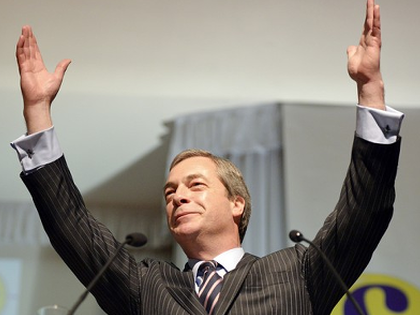
The UKIP numbers in the European Election polls are often referred to as a ‘soft vote’ due to the expectation that many people will go back to one of the ‘major three’ parties in time for Britain’s General Election in 2015. But that trend may be over, as a new Opinium poll for the Observer shows that UKIP’s vote is ‘hardening’, putting Farage’s party on 20 percent.
The results are show that Opinium has discovered another UKIP rise of 2 points from its last poll. The Conservative Party is faring badly at 29 percent, with the Liberal Democrats up two on 9 points. Labour is still in the lead at 33 percent.
The poll reflects information from earlier this week which suggest that 58 percent of UKIP voters in the European Elections will vote UKIP again in 2015.
This is in stark contrast to 2009/10, where UKIP received 16.5 percent of the vote in the 2009 European Elections but just 3.1 percent in the following year’s General Election.
Professor Jane Green of Manchester University told politicalbetting.com: “Our data show that more than half of people, 57.6 percent, intending to vote for UKIP in the May 2014 European Parliament election also intend to vote for UKIP in the 2015 general election, whereas the proportion was half that number at 25.5 percent in 2009.
“UKIP European Parliament voters are also more decided about how they will vote in the general election next year than they were about the 2010 general election in 2009.”
“These findings could have major implications for the UK’s political landscape in 2015 if they are born out in polling stations,” Professor Green added.
UKIP currently does not have a seat in the House of Commons, and may receive the highest ever vote share for a party that does not have an MP, raising questions about the Westminster electoral system.
Indeed an analysis from from Electoral Calculus shows that even with the latest results, UKIP would not gain an MP, while Labour would get a majority of 44 seats with a mandate of just one-third of the British electorate:

The threshold for UKIP to receive just one Member of Parliament according to Electoral Calculus, is when it receives 23 percent of the overall vote share, just 10 percent less than the party that would be in government and have a Commons majority of 44.
This overall trend may be bucked by an anomalous result such as a win for UKIP leader Nigel Farage in a seat such as South Thanet.

COMMENTS
Please let us know if you're having issues with commenting.